As we all know vitamins and minerals are essential micronutrients that your body requires in small amounts to function properly and maintain good health. Both vitamins and minerals are obtained through your diet from various food sources, including fruits, vegetables, grains, dairy products, and lean proteins. A diet ensures that you get an adequate supply of these essential nutrients to support your overall health and well-being. Both vitamins and minerals are important topics in biology.
What are Vitamins and Minerals?
Vitamins: These are organic compounds that are crucial for various bodily functions. They help with energy production, immune system support, and the maintenance of healthy skin, vision, and more. There are water-soluble vitamins (such as vitamin C and the B vitamins), which are not stored in the body and need to be consumed regularly, and fat-soluble vitamins (A, D, E, and K), which can be stored in the body’s fat tissue.
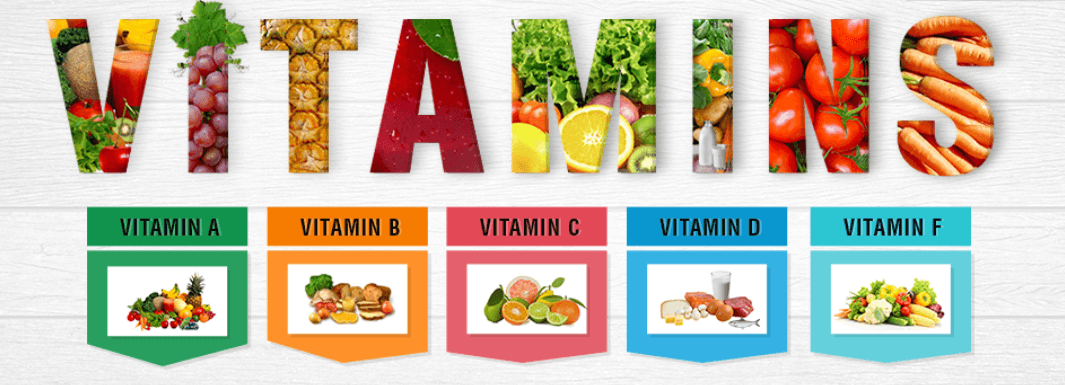
Minerals: These are inorganic nutrients that serve a wide range of functions. Minerals are necessary for the formation of bones and teeth, the regulation of fluid balance, nerve function, and muscle contraction. Common minerals include calcium, iron, magnesium, potassium, sodium, zinc, and others.
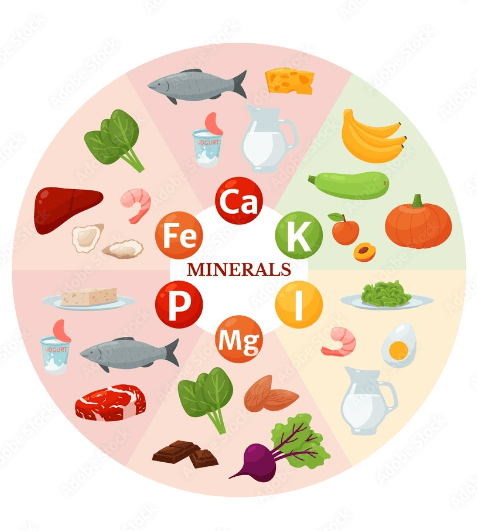
Difference Between Vitamins and Minerals
We have mentioned a simplified comparison, and both vitamins and minerals play crucial roles in maintaining health and well-being. The specific functions and requirements can vary among different vitamins and minerals.
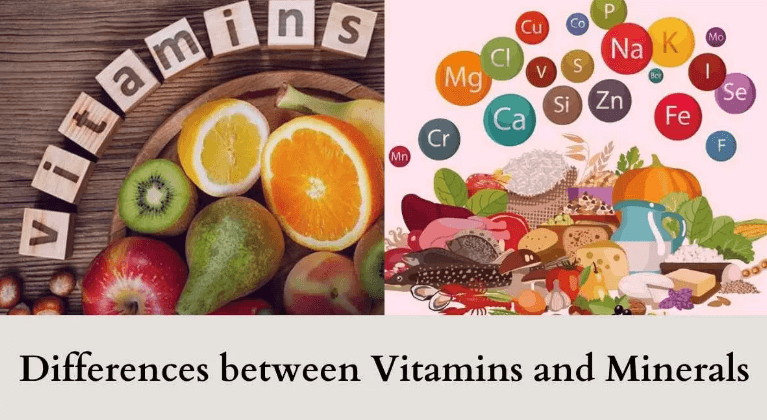
| Difference Between Vitamins and Minerals | ||
| Characteristics | Vitamins | Minerals |
| Types of Nutrients | Organic Compounds | Inorganic Compounds |
| Sources | Vitamins are obtained from food. | Minerals can be found in soil or in water. |
| Required Amount | Vitamins are needed in small amounts. | Minerals are needed in larger amounts. |
| Functions | Coenzymes, and antioxidants, are involved in metabolic reactions, and various body functions. | Structural components, electrolytes, and various physiological functions. |
| Stability | Sensitive to heat and light, can be destroyed during cooking or processing. | Generally stable to heat and light, but can be affected by pH and other factors. |
| Storage in the Body | Generally not stored in large quantities, excess amounts are excreted. | Can be stored in the body, particularly in bones and muscles. |
| Deficiency Effects | Can lead to specific deficiency diseases. | Can lead to specific deficiency symptoms. |
| Examples | Vitamin C, Vitamin D, Vitamin B12, Vitamin K. | Calcium, Iron, Magnesium, Zinc. |
Functions of Vitamins and Minerals
Both vitamins and minerals are very important for various bodily functions. Vitamins support metabolism, immune functions, and tissue health, while minerals contribute to strong bones, muscle function, and oxygen transport. These micronutrients also act as antioxidants, protecting cells from damage. Overall, vitamins and minerals are vital for maintaining good health and preventing deficiencies.
Functions of Vitamins
As we know every vitamin has its own specific function. It’s important to obtain vitamins through a balanced diet, as deficiencies can lead to various health problems. Supplements may be necessary in cases of deficiency, but it’s generally best to get vitamins from natural food sources whenever possible.
- Vitamin A: Necessary for maintaining healthy vision, skin, and mucous membranes. It also supports the immune system and is important for proper growth and development.
- Vitamin B-Complex: This group includes several vitamins (B1, B2, B3, B5, B6, B7, B9, and B12) that are involved in energy metabolism, nerve function, and the formation of red blood cells. All the Vitamin B complexes play a role in the proper maintenance of healthy skin, hair, and eyes.
- Vitamin C: Known for its antioxidant properties, vitamin C helps protect cells from damage, supports the immune system, and aids in the absorption of iron from plant-based foods.
- Vitamin D: Essential for calcium absorption and bone health. It also plays a role in regulating the immune system and cell growth.
- Vitamin E: It works as an antioxidant and helps in protecting cells from damage. It’s important for maintaining healthy skin and eyes.
- Vitamin K: Vitamin K is very necessary for blood clotting and maintenance of bone health. It helps the body make proteins that are essential for these functions.
- Vitamin F (Fatty Acids): Essential fatty acids, such as omega-3 and omega-6, are important for maintaining healthy cell membranes, and brain function, and reducing inflammation.
- Vitamin P (Bioflavonoids): These compounds are often found in fruits and vegetables and work alongside vitamin C to support capillary health and overall immunity.
- Vitamin Q (Coenzyme Q10): It plays a role in energy production within cells and has antioxidant properties.
- Vitamin T (Tocopherol): Similar to vitamin E, it has antioxidant properties and supports skin health.
- Vitamin U (S- Methylmethionine): Involved in the metabolism of sulfur-containing amino acids and may play a role in maintaining gastrointestinal health.
- Vitamin X (No recognized function): Historically, vitamin X was used to describe a substance with unknown properties, and it has no recognized role in human health.
Functions of Minerals
Minerals are essential inorganic nutrients that the human body requires in varying amounts to maintain various physiological functions and overall health. They play crucial roles in processes such as bone formation, nerve function, fluid balance, and enzyme activity. Here we have mentioned a few functions of minerals:
- Calcium: Essential for the formation and maintenance of strong bones and teeth. Calcium also plays a role in the proper functioning of the muscles, blood clotting, and nerve transmission.
- Iron: Necessary for the formation of hemoglobin, which carries oxygen in the blood. Iron is vital for preventing anemia and ensuring proper oxygen delivery to body tissue.
- Sodium and Potassium: These minerals are electrolytes that help regulate fluid balance and maintain proper nerve and muscle function. Sodium is mainly found outside cells, while potassium is mainly inside cells.
- Magnesium: Involved in over 300 biochemical reactions in the body, including muscle and nerve function, blood glucose control, and bone health.
- Phosphorus: Works closely with calcium in bone formation and maintenance. It’s also crucial for energy metabolism and the structure of DNA and RNA.
- Zinc: Essential for immune function, wound healing, and the synthesis of DNA and proteins. It’s also important for the senses of taste and smell.
- Selenium: Acts as an antioxidant and is involved in protecting cells from damage. It also supports thyroid function and the immune system.
- Boron: May play a role in bone health and hormone regulation, although its exact functions are still being studied.

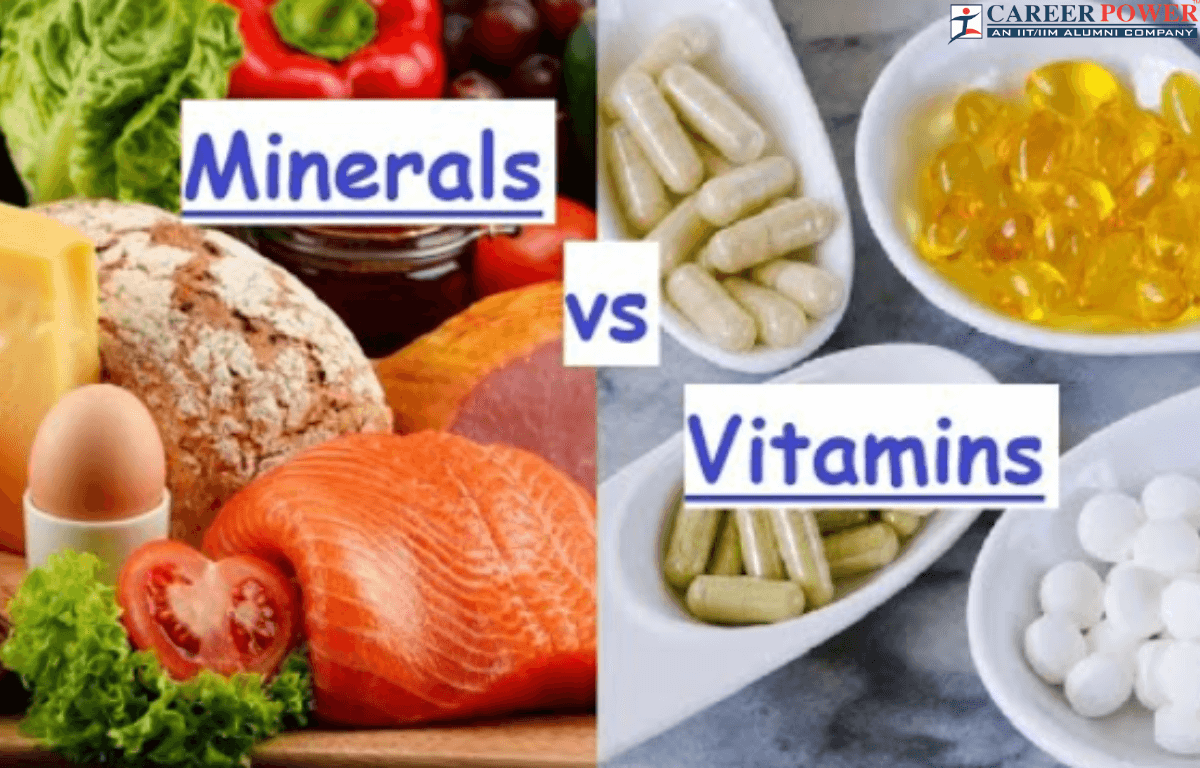

 50 Vegetables Name for Kids in English a...
50 Vegetables Name for Kids in English a...
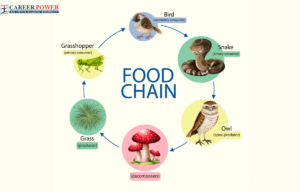 Food Chain: Definition, Types, Examples,...
Food Chain: Definition, Types, Examples,...
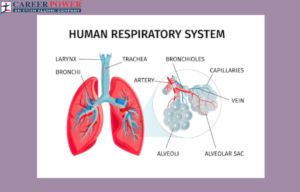 Human Respiratory System: Definition, Di...
Human Respiratory System: Definition, Di...













